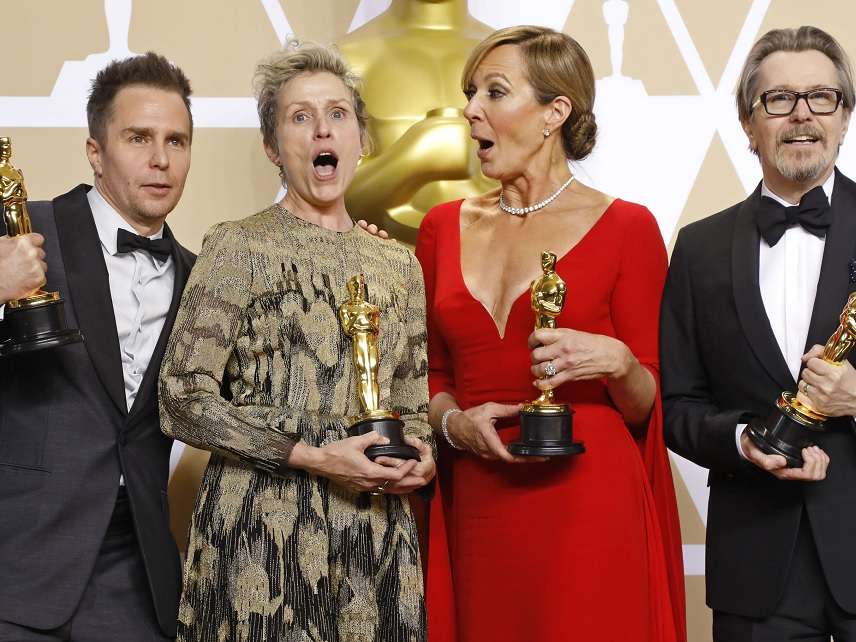Are 'Inclusion Riders' a Libertarian Solution to Workplace Inequality or P.C. Run Amok?
There's nothing wrong with pushing to work with people you want to work with.

At last night's Oscars, best-actress-winner Frances McDormand mentioned "inclusion riders" in an acceptance speech that foregrounded issues of gender equity in Hollywood. After asking all the women in the audience who had been nominated for an award to stand up, McDormand concluded:
Look around, ladies and gentlemen, because we all have stories to tell and projects we need financed. Don't talk to us about it at the parties tonight. Invite us into your office in a couple days, or you can come to ours, whatever suits you best, and we'll tell you all about them. I have two words to leave with you tonight, ladies and gentlemen: "inclusion rider."
So what's an inclusion rider? Actress and comedian Whitney Cummings explains:
an inclusion rider is something actors put into their contracts to ensure gender and racial equality in hiring on movie sets. We should support this for a billion reasons, but if you can't find a reason to, here's one: it will make movies better.
— Whitney Cummings (@WhitneyCummings) March 5, 2018
Stacy Smith, who runs the Annenberg Inclusion Initiative at the University of Southern California, told The New York Times,
…a typical inclusion rider would set benchmarks for diversity in staffing. As an example, it could require the cast be 50 percent female, 40 percent underrepresented ethnic groups, 20 percent people with disabilities, and 5 percent L.G.B.T. people…. It would also require that there be "a good-faith effort to ensure representation in key areas behind the camera"…. A failure to meet the terms of the rider could lead to a fee or a penalty for the studio or distributor that doesn't meet the contract terms."
Let's leave aside for the moment whether writing gender and racial equality into contracts for movie productions will make them better. Are inclusion riders compatible with libertarian ideas about using "market power" and voluntary association to change society? At first blush, absolutely. The movie industry is notorious for placating leading stars, directors, and producers when it comes to demands for creative control, profit-sharing, and all sorts of idiosyncrasies (read about Tom Cruise's custom thongs, if you dare). For creative people who have strong feelings about racial, gender, age, or even ideological representation both in front of and behind the camera, an inclusion rider is simply an instrument to make that happen. It's really no different that choosing to spend your dollars in one store rather than another because you like the owners' philosophy or philanthropy more.
The question of how this sort of initiative will affect quality is a different matter, of course. Quality is a very subjective category, of course, though in Hollywood it's often seen as identical with box-office returns. When political statements override all other concerns in creative endeavors, the result is often the worst sort agitprop that turns off even sympathetic audiences. There are plenty of ways in which any sort of diversity directive can go wrong, but that's also equally true for the status quo. Most movies are pretty mediocre, after all. There's no reason from the outset to believe that inclusion riders will raise costs or decrease quality. And if it will help change a Hollywood culture that has often lagged the larger culture in inclusion, that's good (there's a reason it took 90 years for the Oscars to feature a woman and an African American simultaneously in the Best Director category).
Acknowledging that pushes for diversity have been treated as fads in Hollywood with no lasting effects, [McDormand told the Times]: "The whole idea of women trending? No. African-Americans trending? No. It changes now." And inclusion riders, she said, can mean real change.
Despite a progressive veneer, the production companies and distribution networks comprising "Hollywood" have been unmasked as extremely regressive in actual practice. That's the big takeaway from last year's Weinstein revelations and it extends past gender relations to all sorts of old business practices based on old business models (remember how the film industry lobbied against VCRs, because it mistakenly saw them as a threat of movie sales?). Whether there's enough momentum to sustain actual change in hiring and production practices is yet to be seen.
Related: "5 Great Libertarian Movies!"


Show Comments (112)